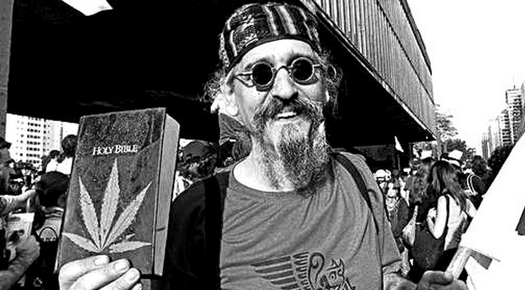
First Church of Cannabis in Indiana, a newly formed religious sect that claims using marijuana is a sacrament, was recently granted a tax-exempt status by the Internal Revenue Service.
“We are pleased to inform you that upon review of your application for tax exempt status we have determined that you are exempt from Federal income tax,” read the letter from IRS to the church, dated May 21. “We determined that you are a public charity.”
Bill Levin, the church’s founder, explained that the tax-exempt status means his organization could take complete advantage of the benefits of being perceived as a public charity by the federal government, including limitations on the IRS’ ability to audit the church, deductions of the church’s financial contributions as well as qualifying to receive tax-deductible gifts among others. The exemption would also serve good purpose for the $11,000 that the church has managed to raise through a crowd-funding account over the last couple of months.
“The approval came in under 30 days, which if you're a lawyer you sort of go, 'How the hell did that happen?'” Levin said. “We filled out the long form, sent it in to the IRS and expected that usual 180-day wait -- but it was back on our desk in under 30 days.”
While the IRS’ official website says it will respond to a long-form application within 180 days, Levin fell short of words while explaining how his new church received such a quick turnaround.
“It is the power of love,” he said.
Levin’s organization is likely to put to test Indiana’s weighed down religious freedom law, which at the time of being introduced, allowed businesses to discriminate against the state’s LGBT population. After a lot of criticism against the original text of the law however, Governor Mike Pence signed into law a revised version that prohibited businesses from denying goods and services to lesbians, gays, bisexuals and transgender individuals.
While many have questioned the true intentions of Levin’s church, which includes using marijuana as part of acquiring membership, he said he is darn serious about his new faith; which is based on the universal principles of love, compassion, respect and equality. He drew parallels with similar religious movements like Rastafarianism in Jamaica, where adherents view cannabis use as a sacrament, and said members of his church, whom he calls Canatarians, would adopt same beliefs in the plant. However, unlike Rastafarians, Canatarians would have no traditional deity at the top of the faith.
“It has nothing to do with God; I don't have the balls to describe a god to anybody,” Levin said.
Levin believes that the human body has an innate need to consume cannabis for the many health benefits it has to offer, like healing problems caused by the excessive consumption of sugary foods and drinks.
While the church had already been officially recognized by the state secretary in March this year, its recent tax-exempt status goes on to further cement its image as an actual church. However, it is still unclear how Indiana would respond to the church’s promotion of marijuana use, as using the substance continues to be prohibited under state law. A church requiring sacramental marijuana use is not without precedent, as many have emerged across America with varying degrees of success but much of their survival has depended on a state decriminalizing the use of marijuana if not legalizing it for restricted purposes.
Abdul Hakin Shabazz, an attorney and political commentator in Indiana, told the media in March that if Levin could convince the state that consuming marijuana is part and parcel of the religion’s practices, as allowed under RFRA, he might stand a good chance at getting away scot-free.
In a recent interview, Jon Sturgill, the church’s attorney, argued that Canatarians deserve similar protections for using marijuana as members of more mainstream religions, like Catholicism, are already privy to for the consumption of wine.
“You've got 300 people at a Mass and 50 minors going up and drinking wine -- is it illegal outside the confines of that sanctuary? Yes,” Sturgill said. “It is not, because it is an exemption under RFRA.”
When asked where Canatarians would congregate, Levin said he was still in search of an appropriate venue and the church would soon finalize a building.
“The reality of it is we are a 90 day old business with no credit and $10,000 in the bank,” Levin said about acquiring a space for the church. “It's just a matter of being creative with the financing.”
Levin is confident that a building would be found in time for the church to organize its first service on July 1, as soon as RFRA is implemented. He said that he is expecting over 1,000 people to attend the church’s first service.
“The law goes into effect at noon, and we'll start our service at 12:01 p.m.,” Levin said. “For the first service, there will be live music, storytelling and an interactive discussion of what it means to live, love, laugh, learn, create, grow and teach” Levin said.
After that, the church’s congregation would stand up and read aloud the foundational tenets of the religion, which Levin has based on Deity Dozen, including advices such as “Laugh often, share humour” and “Don’t be an asshole”. In conclusion, Levin said all the members of the church would light up a doobie each and celebrate the birth of a new religion.
Photo Credits: The Smoking Bud
